TL;DR: Best AI Agents of 2026
AI agents are revolutionizing how businesses operate by enabling automation that adapts, learns, and makes decisions in real time. Unlike static tools, these autonomous AI systems tackle complex tasks across industries, handling everything from customer support and sales to research and analytics.
As demand for intelligent, scalable solutions grows, AI agents are becoming essential for companies seeking to boost productivity, reduce costs, and stay competitive. In this blog, we will explore the top AI agents for 2026, uncovering their use cases, key features, and how they are transforming modern workflows.
Get a tailored plan to cut handle time and boost CSAT. Book a demo
Understanding AI Agents and Why They Matter?
AI agents are intelligent, autonomous systems that go beyond static automation by continuously perceiving, analyzing, and acting on data to achieve complex objectives. Unlike chatbots or digital assistants, they operate independently, learning from context and feedback to handle multi-step workflows such as customer support, sales prospecting, and research. For instance, a leading telecom company deployed AI agents to manage 80% of routine customer inquiries autonomously, freeing up human agents for complex issues, while an e-commerce giant uses AI agents to handle real-time product recommendations and complaint resolution, reducing response times by 60%.
The AI agent market in 2026 is booming, with solutions like ChatGPT’s Deep Research, NVIDIA Eureka, Microsoft Copilot, and SAP Joule leading the pack. Robylon AI stands out with its uniquely tailored approach to custom AI chatbots, setting your brand apart from the rest.
See how agents handle tasks, escalate, and work with your team in our Beginner’s Guide to Understanding AI Agents
2026’s Leading AI Agents Transforming Digital Operations
As AI technology evolves rapidly, 2026 has ushered in a new generation of intelligent AI agents that not only assist but proactively handle complex tasks, from customer service to research and automation. These AI-powered solutions are transforming how businesses operate, driving efficiency, personalization, and innovation across industries.
Let’s take a closer look at the top AI agents of 2026, including a few emerging solutions.
1. Robylon
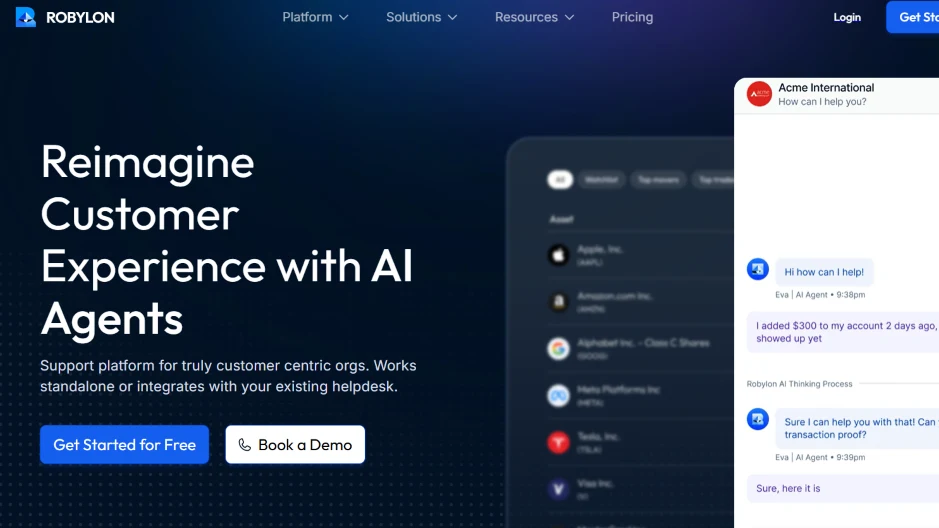
What it does?
Robylon builds AI-powered customer support agents that handle conversations across email, chat, and voice channels in multiple languages. These agents integrate with CRMs and automate issue resolution at enterprise scale.
Why does it matter?
Robylon helps businesses deliver fast, accurate, and personalized support 24/7, cutting operational costs and improving customer satisfaction. It is designed for industries like banking, telecom, and e-commerce, where large-scale, high-quality support is essential.
Challenges
Continuous fine-tuning is needed to maintain accuracy and customer trust.
Example
- A customer asks, “Where’s my order?” The Robylon's AI agent instantly pulls order details from Shopify, checks the delivery status, and responds: “Your package will arrive tomorrow! ”Hence, no human agent required.
- Or, a customer asks via chat support, “Does my product have a warranty?” Robylon checks the database, finds the warranty details, and responds with accurate terms.
2. OpenAI Operator
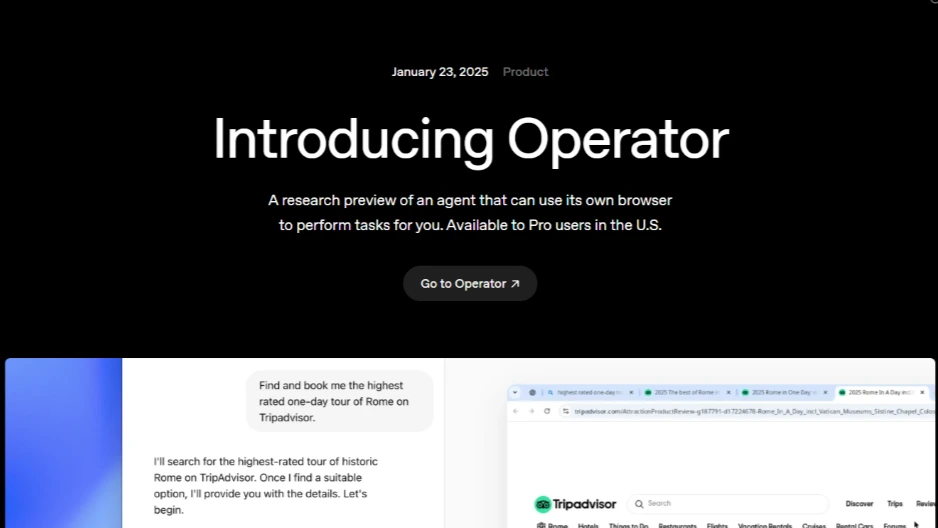
What it does?
Operator is OpenAI’s next-generation AI agent that goes beyond static prompts, capable of autonomously navigating software interfaces to complete multi-step tasks like booking a flight, conducting market research, or drafting detailed reports.
Why does it matter?
It enables complex, human-like task execution across multiple apps, freeing users from micromanaging AI steps.
Challenges
Handling complex, multi-step tasks across diverse and unpredictable software environments.
Example
- Insert the prompt for what you need Operator to do, like “Book the cheapest nonstop NYC-Paris flight using my points and mark the calendar.” No hassle, the Operator takes care of everything at once.
- If you command it, “Find me a 2-bedroom apartment in Brooklyn under $3,000, pet-friendly, and near the subway. Schedule a viewing next Saturday at noon.” And it's done, adding the viewing details to your calendar.
3. ChatGPT’s Deep Research
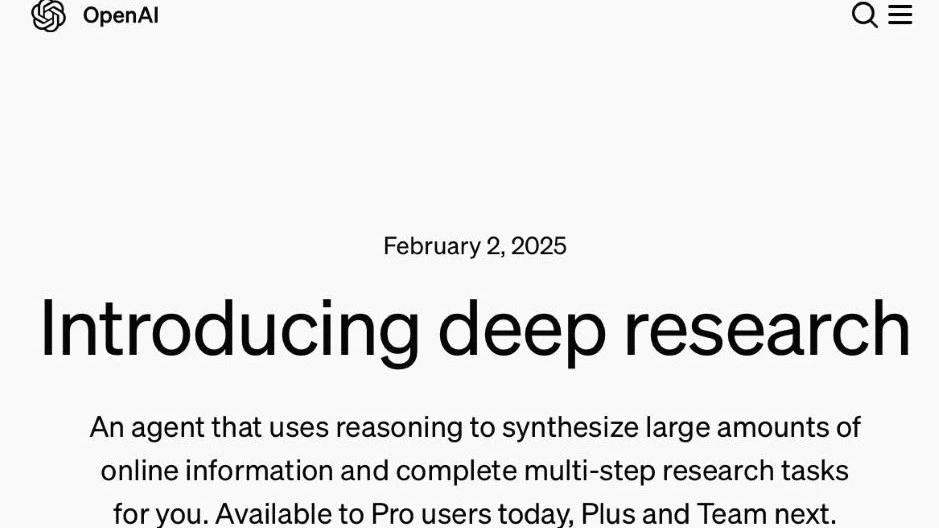
What it does?
When you need an in-depth, Sherlock Holmes-level report, ChatGPT’s Deep Research kicks in. It cross-references data from multiple sources, analyzing topics like climate change’s impact on real estate, etc., offering nuanced, multi-perspective insights.
Why does it matter?
Perfect for users who need detailed research, multiple viewpoints, and citations without spending hours manually compiling information.
Challenges
It is a thorough, graduate-student-level effort but can sometimes feel like overkill for casual questions.
Example
- A student asks, for research on “What are the latest theories on renewable energy economics for my thesis?” The agent scans papers, insights, and debates, delivering a sharp summary of key trends, gaps, and sources.
- Or, while looking to upgrade their smartphone, a person asks, “What is the best camera phone under 80,000 rupees right now?” ChatGPT’s Deep Research compares expert reviews, specifications, and sample pictures, accordingly summarizing the best option for your budget.
4. Google Gemini Deep Research
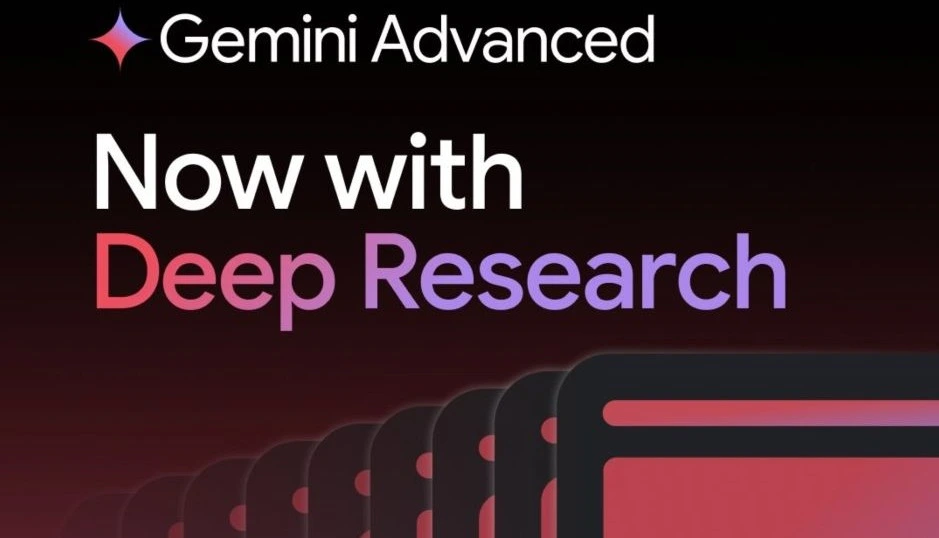
What it does?
Similar to ChatGPT’s Deep Research, Gemini’s version can generate full reports, citations, and even spreadsheets summarizing data, reviews, and recommendations.
Why does it matter?
Excellent for shopping comparisons, detailed market analyses, or style-based recommendations (like finding affordable, stylish running shoes with Reddit feedback and images).
Challenges
Can be a bit overwhelming for simpler queries, while it shines when you need thoroughness and multi-format outputs.
Example
- If you ask Gemini, “Among Netflix, Jio-Hotstar, or Prime Video, which one is the best for family content in 2026?” It analyzes catalogs, pricing, and ratings to deliver a clear summary.
- Or, a job seeker asks, “Which industries are hiring the most in remote marketing roles?” The agent compiles data from hiring platforms, reports, and expert blogs, summarized into a short, actionable brief.
5. Microsoft Copilot Agents
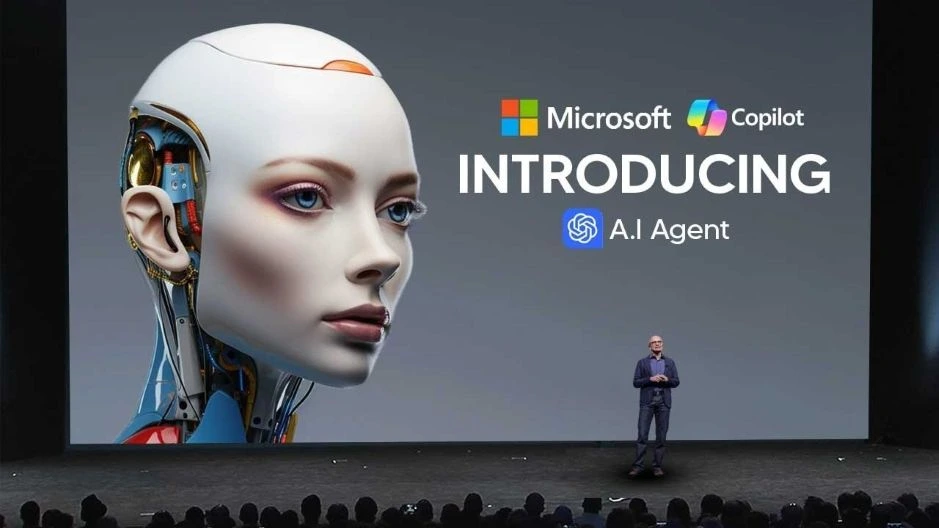
What it does?
Copilot is like a hyper-efficient coworker inside Microsoft 365, handling tasks like drafting emails, summarizing reports, and managing service workflows.
Why does it matter?
Integrated deeply into the Microsoft ecosystem, it excels at task execution across sales, finance, and service workflows; you can even build custom Copilot agents for your unique processes.
Challenges
Less useful if you do not use Microsoft’s ecosystem.
Example
- After a Teams call, Copilot writes the minutes, assigns tasks in Planner, and drafts thank-you emails, so nothing falls through the cracks.
- Or upload your draft slides and ask “Copilot to improve the design, add key insights, and generate speaker notes,” and the copilot will create the slideshow.
6. NVIDIA Eureka
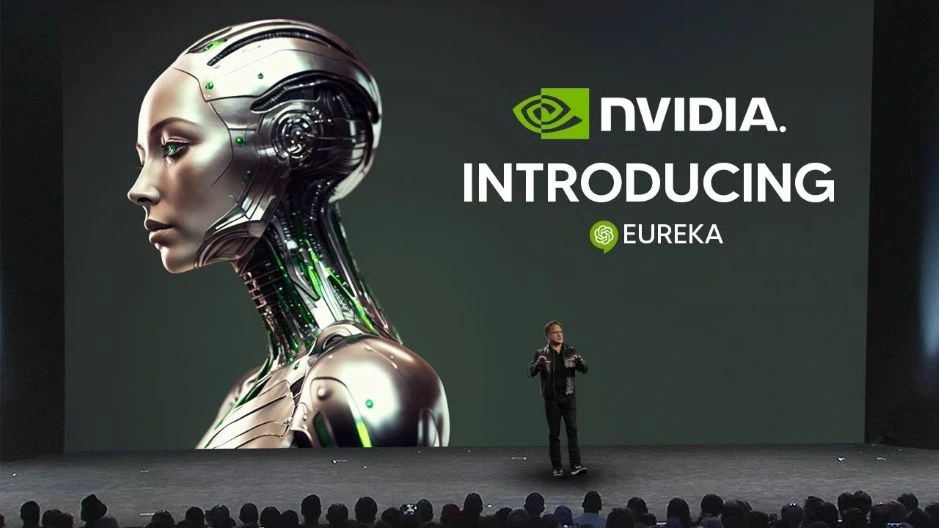
What it does?
NVIDIA Eureka is a powerful AI agent built on GPT-4, designed specifically for training robots in dynamic environments. Eureka autonomously refines robotic behavior by observing, adjusting, and optimizing each iteration.
Why does it matter?
Industries such as manufacturing, logistics, and even sports are now able to develop robots that can adapt, self-correct, and perform high-skill tasks without constant human supervision.
Challenge
The system’s effectiveness depends heavily on having access to robust simulation environments and high-quality training datasets.
Example
- Imagine a robotics company developing bots for sports training. With NVIDIA Eureka, robots can be taught to dribble, pass, or catch a ball with remarkable accuracy.
- In the logistics space, warehouse bots can learn to optimize package handling or shelf stacking through repeated simulation-based learning.
7. SAP Joule
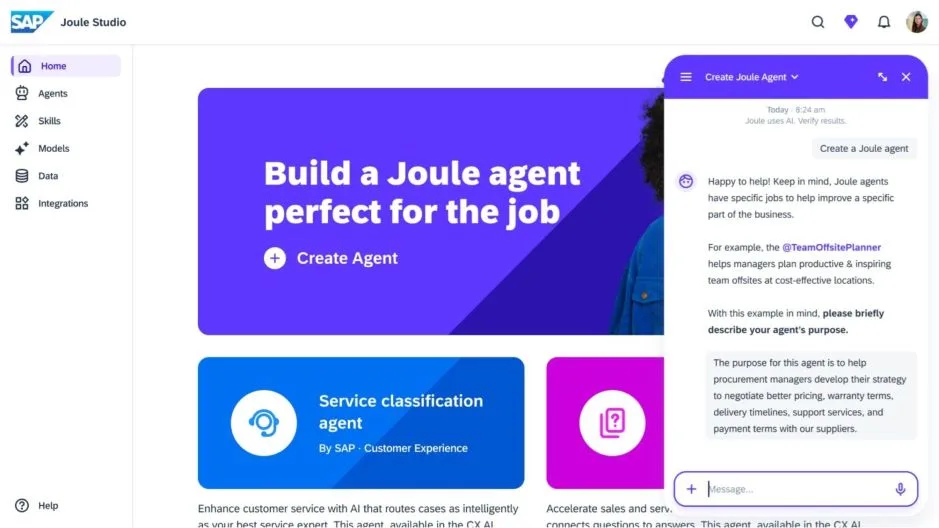
What it does?
SAP Joule is an advanced AI agent engineered for enterprise environments, combining large language models (LLMs) with real-time business data from SAP systems. It acts as an enterprise AI agent delivering insights, flag anomalies, and suggest actions.
Why does it matter?
In large organizations, data is often siloed and underutilized. Joule bridges that gap by contextualizing enterprise data, making it easier for decision-makers to act with confidence and speed.
Challenges
Joule’s performance is tightly linked to the quality and integration of business data across SAP systems. Enterprises must ensure clean, well-structured datasets and properly configured SAP infrastructure to get the most out of the AI agent.
Example
- If commanded, Sap Joule sees a sudden dip in sales for a specific region, pinpoints the cause (a competitor’s promotional strategy), and recommends a counteroffer.
- Or, Joule spots that next month’s payables will exceed receivables, alerts the Finance department, and suggests delaying a non-urgent purchase order.
8. Replit Agent

What it does?
Replit’s AI Agent is a versatile AI coding assistant tailored for developers, data scientists, and software engineers. It interprets natural language prompts to write functional code, automate app building, fix bugs, and generate clear documentation.
Why does it matter?
For startups, solo developers, and agile teams, time-to-market is critical. Hence, it reduces development bottlenecks by turning abstract ideas into executable code almost instantly.
Challenges
Although the agent performs well in general development tasks, it can encounter difficulties with large-scale enterprise applications or domains that require strict regulatory compliance.
Example
- A developer struggling with API documentation asks Replit for assistance, and it walks through the endpoints, generates sample requests, and shows how to integrate them.
- Or, if a data scientist asks, “Help me model this prediction.” Replit writes a Jupyter notebook with clean, commented code which is ready to run and tweak
9. Cursor AI

What it does?
Cursor is an AI coding assistant built into your development environment; it not only helps write code but also automates refactoring, debugging, and code explanations. It integrates directly into VS Code, so developers can chat with the AI alongside their projects.
Why does it matter?
Developers save hours on repetitive tasks, improve code quality, and learn from real-time explanations. Cursor makes collaboration between humans and AI seamless in the coding workflow.
Challenges
Cursor’s power depends on the quality of the codebase context; it can struggle with large, complex projects or nuanced logic without clear documentation.
Example
- A new developer clicks a confusing function, and when commanded, Cursor writes a plain-language summary of what it does and where it is used, cutting hours of guesswork.
- Or when a developer asks, “Add tests for this module,” Cursor writes clean, runnable test cases, ensuring coverage and saving time.
10. Devin
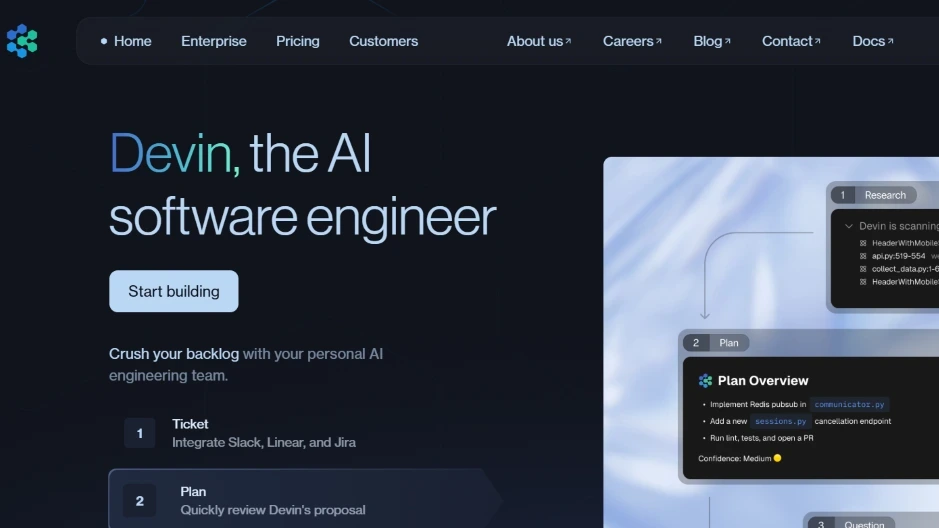
What it does?
Devin is the first fully independent AI software developer. It does not just suggest code; it can plan, code, debug, test, and deploy software projects end-to-end, working like a real junior developer on your team.
Why does it matter?
Devin revolutionizes software engineering by lowering barriers to entry, allowing startups and solo entrepreneurs to build complex software without large teams.
Challenges
While powerful, Devin’s autonomy can introduce errors, especially in high-stakes codebases where human oversight remains essential. It’s an assistant, not yet a senior engineer replacement.
Example
- A boutique owner asks, “Add a ‘recommend a friend’ widget in a light-blue theme.” Devin updates the theme code, tests it, and deploys it live - no freelance developer needed.
- Or A team requests, “Add Stripe payments to our web app.” Devin writes the integration, handles error cases, and tests end-to-end.
11. GitHub Copilot

What it does?
Copilot is an AI coding assistant that suggests code snippets, entire functions, and even complex logic based on natural language prompts. It’s deeply integrated into GitHub and VS Code, trained on millions of open-source repositories.
Why does it matter?
Copilot boosts developer productivity, accelerates prototyping, and makes coding accessible to non-experts, a massive win for individuals and teams.
Challenges
Copilot can sometimes generate inaccurate or non-optimized code, and there are legal concerns around IP rights when using AI-generated code based on open-source training data.
Example
- A computer science student asks, “Binary search in Java, commented.” Copilot writes the function with step-by-step explanations, turning concepts into clarity.
- Or A marketer commands, “HTML email with hero image, two columns, and a CTA button.” Copilot autocompletes the code; preview ready.
12. Oracle’s Miracle Agent
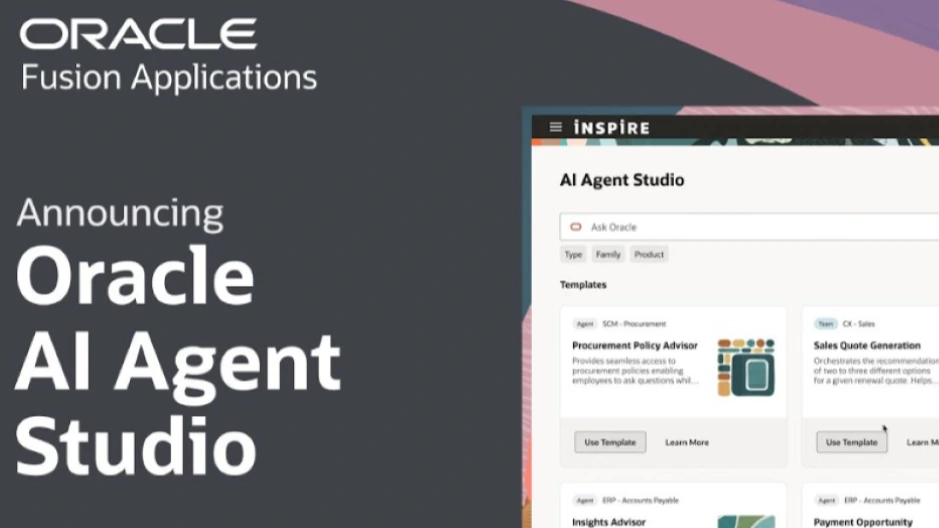
What it does?
Automates complex workflows across finance, HR, and supply chain in Oracle Fusion Cloud, handling tasks, approvals, and unstructured data.
Why does it matter?
Reduces manual work, speeds up decisions, and streamlines enterprise operations.
Challenges
Limited to Oracle ecosystems; setup and data alignment can be complex.
Example
- HR says, “Summarize the key changes in our new health benefits policy and draft an all-staff email.” The Oracle’s agent scans the document and generates a friendly, clear update.
- Or a project manager asks, “Highlight the risk clauses in this supplier contract.” Copilot reviews the document, flags key terms, and summarizes them in simple English.
Emerging AI Agent Innovations
Other standout tools shaping the 2026 landscape include
- D-ID Agents: Video-powered avatars for engaging face-to-face digital conversations in customer service and training.
- Cognition’s AI Agents: Autonomous decision-makers that execute multi-step logic across industries.
- AutoGPT: Open-source framework for building self-learning AI agents to research, generate content, and handle complex tasks.
- Amazon Bedrock AI Agents: AI-powered enterprise assistants built on AWS services for seamless integration and scalability.
- Sierra AI Agents: Sales-focused AI agents that identify, qualify, and engage leads through dynamic, conversational interactions.
Real-World AI Agent Impact
Companies like Amazon, Sephora, and Tredence are already seeing massive benefits
- Amazon: AI-generated review summaries, the Rufus AI-powered conversational shopping assistant, and "Just Walk Out" technology redefine e-commerce and retail.
- Sephora: AI agents enhance customer engagement, boost sales, and integrate with loyalty programs across channels.
- Tredence: Deploys custom AI agents for Fortune 100 firms, driving efficiencies in marketing, operations, and product management.
Why It Matters: Choosing the Right AI Agent
Selecting the right AI agent can make or break how effectively your business runs every day. In 2026, businesses are not just looking for smart tools. They want systems that fit into their world, tools that understand their customers, data, and tone of voice. The enterprise tools like Copilot or ChatGPT offer broad features, but the real value lies in solutions that deliver precision at scale.
Whether it is a startup seeking rapid automation or a large enterprise aiming for high-touch customer interactions, the future belongs to AI agents that can seamlessly integrate into existing workflows and grow alongside the business. That’s why more companies are turning to specialized platforms that go beyond automation and understand the work. Ready to turn your AI idea into reality? Start building your custom agent now → AI Agent Frameworks: A Strategic Overview.
Robylon AI reflects this shift. It builds custom AI agents that reflect a brand’s tone, language, and operational goals to both your team and your customers. Whether it is resolving support tickets or scaling multilingual engagement, the right agent should feel like a natural extension of your team. The result? Faster responses, fewer mistakes, and a better customer experience, without the overhead.
Where AI Agents Are Headed?
In 2026, AI agents are getting smarter and more focused. Businesses no longer want generic tools. They want AI that knows their product, speaks in their tone, and integrates directly into their systems.
In 2026, precision and context drive AI innovation. AI agents are evolving to be smarter, more focused, and tailored for business needs. It is not just about answering questions; it’s about solving real problems. That means tighter integration with CRMs, live data, and internal knowledge.
Agents like Robylon’s are built for this new reality. They are built to reflect your offerings, processes, and tone. That kind of precision is not optional anymore; it is the new standard. Explore how AI lifts CSAT, speeds replies, and keeps context in our detailed blog: How AI Improves Customer Experience (CX) in 2026
Conclusion: Making the Right Choice
As we move deeper into the AI revolution, one thing is clear: the future of business runs on AI agents. From writing code to running support, they are reshaping how teams work. From research platforms like ChatGPT Deep Research to intelligent workplace tools like Microsoft Copilot and code-gen agents like Devin, the ecosystem is expansive and varied.
While for many businesses, real value comes from agents built around their workflows. That is where Robylon fits in. It brings unmatched value through tailored automation and conversational accuracy. Whether automating routine customer support, enhancing lead qualification, or responding in multiple languages, these agents are designed to evolve with you, making sure every customer interaction feels intentional.
As AI agents evolve, businesses must prioritize solutions that align with their unique challenges, whether that is scaling software development, delivering seamless multilingual support, or automating complex decision-making processes. Businesses adopting AI agents now will lead the market tomorrow
Why Robylon Stands Out?
Robylon is redefining customer support by building multilingual AI agents that integrate directly into chat, email, and voice systems. Unlike one-size-fits-all tools, Robylon customize each agent to mirror your brand’s tone, workflows, and knowledge base delivering 24/7 accurate responses across channels. With seamless CRM integration and enterprise-grade automation, Robylon is not just an AI tool, it is an extension of your customer support team.
Ready to unlock your business potential with the right AI agent? Let’s build what is next, together!
FAQs
What is the difference between AI copilots and AI agents?
AI copilots assist users in real time within tools, while AI agents operate more autonomously, handling full workflows without constant user input.
What should I look for when evaluating AI agents in 2026?
Prioritize agents that are autonomous, tool-integrated, context-aware, and able to learn from interactions so they grow with your business.
What are some of the best AI agents in 2026?
Top AI agents include Robylon AI, OpenAI Operator, ChatGPT Deep Research, Microsoft Copilot, and NVIDIA Eureka each tailored for different use cases.
Are AI agents replacing human jobs?
Not exactly. They are working as our co-pilots, reducing repetitive tasks so human teams can focus on complex issues and relationship-building.
How do I choose the right AI agent for my business?
Look for agents that integrate with your tools, understand your workflows, and can scale with your business needs, like Robylon for customer support.
Which industries benefit the most from AI agents?
Industries like e-commerce, telecom, healthcare, finance, and SaaS benefit most from AI agents by automating support, boosting sales, and streamlining data-driven operations.
How Are AI Agents Different from Chatbots?
AI agents are autonomous, goal-oriented systems that learn, use tools, and handle complex tasks, unlike chatbots, which are reactive, rule-based systems and limited to simple interactions.
What Are AI Agents?
AI agents are autonomous systems that perceive, decide, and act to achieve goals. They can handle complex, multi-step tasks with minimal human input.





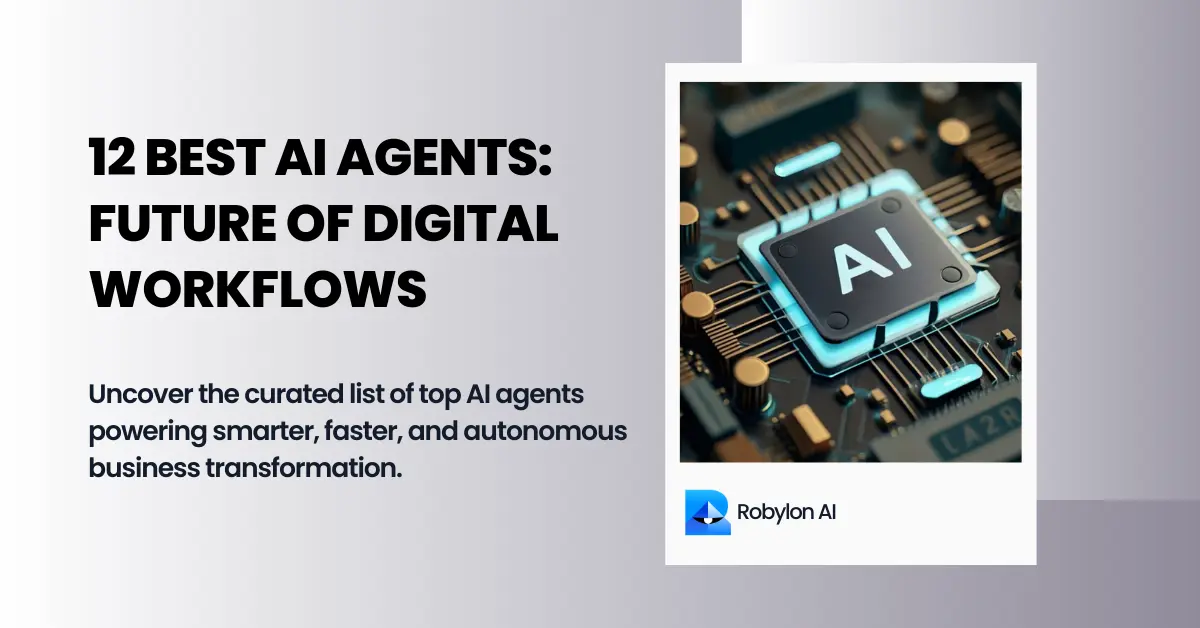
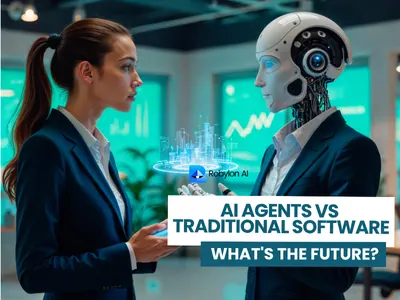
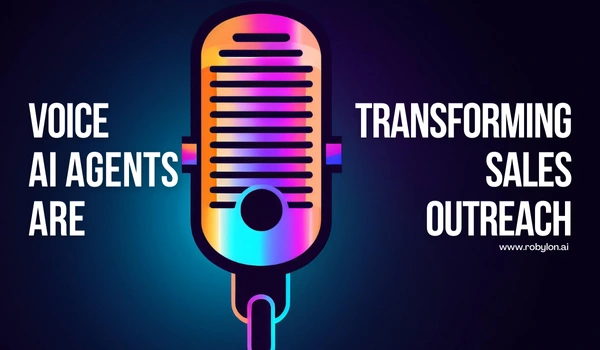

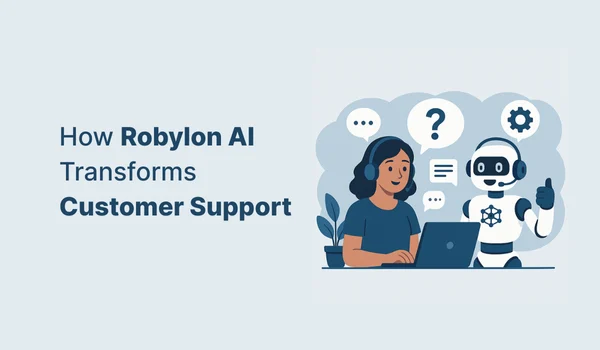
.png)
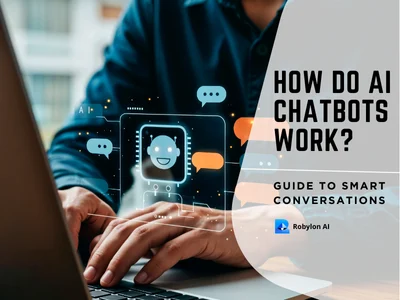
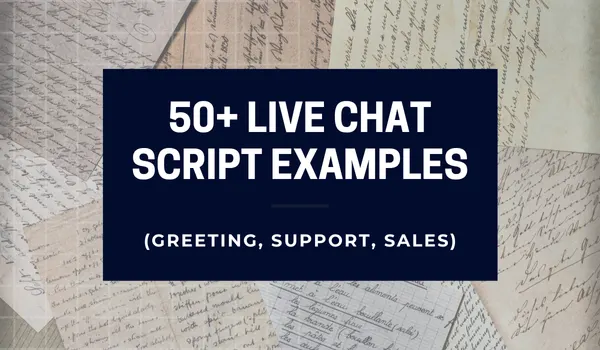
.webp)












